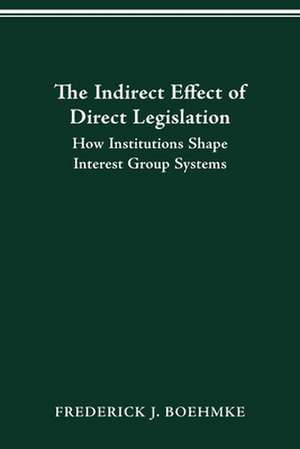THE INDIRECT EFFECT OF DIRECT LEGISLATION: HOW INSTITUTIONS SHAPE INTEREST GROUP SYSTEMS
Autor FREDERICK J BOEHMKEen Limba Engleză Paperback – 28 ian 2021
To demonstrate this, the author models the incentives that the initiative process creates for interests to organize and for how they communicate their preferences to policy makers. Interests that represent a broader range of the public are found to gain the most from the option to propose initiatives, implying that the set of organized interests in initiative states should reflect this advantage. Ironically, an effect of direct legislation is to potentially increase the effectiveness of special interest lobbying in state legislatures—in a sense, the opposite of the direct control that gives direct legislation its theoretical appeal. Yet, the clear effect is one of empowering voices that traditionally had very little effect in the legislative process. If greater representation is the goal of direct legislation, it is a clear success, even though that success does not really come in the act of ballot initiatives itself.
Preț: 276.98 lei
Nou
Puncte Express: 415
Preț estimativ în valută:
53.00€ • 54.76$ • 44.09£
53.00€ • 54.76$ • 44.09£
Carte tipărită la comandă
Livrare economică 15-21 martie
Preluare comenzi: 021 569.72.76
Specificații
ISBN-13: 9780814257098
ISBN-10: 0814257097
Pagini: 232
Ilustrații: 26 tables, 9 figures
Dimensiuni: 152 x 229 x 18 mm
Greutate: 0.35 kg
Editura: Ohio State University Press
Colecția Ohio State University Press
ISBN-10: 0814257097
Pagini: 232
Ilustrații: 26 tables, 9 figures
Dimensiuni: 152 x 229 x 18 mm
Greutate: 0.35 kg
Editura: Ohio State University Press
Colecția Ohio State University Press
Recenzii
“Boehmke’s findings are important enough that the book will be a must-read for those interested in state politics, direct democracy, and interest-group politics. The cumulative effect of all these findings is very impressive.” —Frank Baumgartner, Pennsylvania State University
Notă biografică
Frederick J. Boehmke is assistant professor of political science at the University of Iowa, Iowa City. In August 2005 he will be Robert Wood Johnson Scholar in the School of Public Health at the University of Michigan, Ann Arbor.
